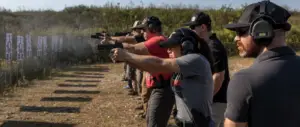 Our Defensive Tactics and Firearms Training programs are designed to equip security professionals, law enforcement personnel, and individuals with the knowledge and skills needed to effectively manage high-pressure situations. Combining expert instruction with real-world scenarios, our training focuses on safety, precision, and preparedness, ensuring participants are ready to respond to any threat confidently and responsibly.
Our Defensive Tactics and Firearms Training programs are designed to equip security professionals, law enforcement personnel, and individuals with the knowledge and skills needed to effectively manage high-pressure situations. Combining expert instruction with real-world scenarios, our training focuses on safety, precision, and preparedness, ensuring participants are ready to respond to any threat confidently and responsibly.
Core Components of Training Programs:
- Defensive Tactics:
- Hand-to-Hand Combat: Training in non-lethal self-defense techniques to neutralize threats without resorting to weapons.
- De-escalation Techniques: Learning verbal and non-verbal strategies to diffuse potentially volatile situations while maintaining control.
- Use of Restraints: Proper techniques for applying handcuffs or other restraints safely and effectively.
- Situational Awareness: Enhancing observational skills to identify and assess threats proactively.
- Firearms Training:
- Basic Firearms Safety: Comprehensive instruction on firearm handling, storage, and safety protocols to prevent accidents.
- Marksmanship: Developing precision and accuracy through hands-on practice on the shooting range, tailored for various firearm types.
- Weapon Retention: Techniques to prevent unauthorized access to your weapon in close-combat situations.
- Force Continuum Training: Understanding the appropriate use of firearms as part of a broader framework of escalating force responses.
- Advanced Tactical Training:
- Active Shooter Response: Simulated drills and scenarios to prepare for responding to active shooter situations with minimal risk to bystanders.
- Close-Quarter Combat (CQC): Tactical training for confined spaces, ensuring quick, effective decision-making in close-proximity encounters.
- Firearms for Security Professionals: Specialized training tailored to armed security roles, focusing on situational applications in commercial and residential settings.
- Legal and Ethical Training:
- Use-of-Force Laws: Education on state and federal laws governing the use of force, ensuring all actions are legally justified.
- Liability Management: Understanding the legal implications of defensive actions and how to minimize risk.
- Scenario-Based Training:
- Realistic, high-stress simulations to test and enhance decision-making, situational adaptability, and tactical execution.
- First Responder Skills:
- Basic medical training, including wound care and CPR, to assist in emergencies until professional medical help arrives.
Our training programs are conducted by certified instructors with extensive backgrounds in law enforcement, military, and security operations. Each course is tailored to meet the specific needs of participants, from beginners to seasoned professionals, ensuring a comprehensive and practical learning experience.
By providing the highest level of instruction and fostering a culture of responsibility, we aim to empower individuals with the skills they need to protect themselves, others, and the environments they serve.
